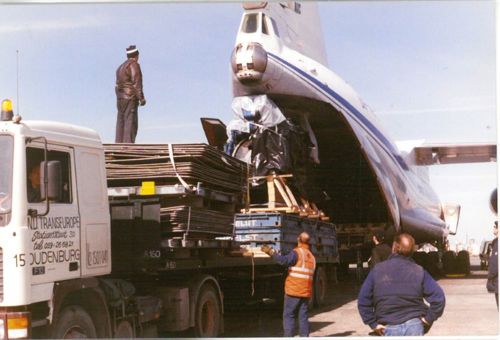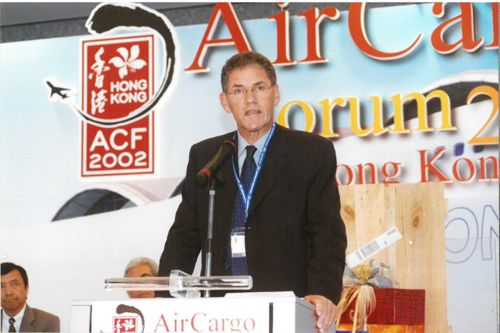
Since its foundations in the mid-90s, Coyne Airways has built up a reputation serving developing markets, which involved overcoming more than the fair share of challenges. For Larry Coyne, his history in business has been about embracing challenges to get things done.
After graduating from Wharton Business School, Coyne worked in consultancy, films and TV, then property development, which came crashing down in the early 90s. He entered aviation in 1993 when a Russian aviation insurance agent challenged Coyne to find work for hundreds of Ilyushin IL-76s so the agent could insure them.
Being a charter broker proved to be surprisingly successful and soon Coyne was doing almost daily freighter flights to exotic locations across what been the Soviet Union a few years earlier. Coyne decided the real market was in moving smaller items, which required an Airway Bill code and a flight designator.
Coyne comments, “That proved very difficult but I got there in the end and moved from doing full charters to moving as many as 80 to 100 separate shipments on separate flights to a handful of key destinations.”
Moving from charters to regular services required much more involvement and meant going to places few westerners had previously set foot in. Soon there were scheduled services to locations including Baku, Tbilisi, Yerevan, Aktau, Tashkent, Uralsk, Atyrau and Ashkhabad.
“Of course it didn’t take long for others to see the potential and we soon found ourselves with competitors,” Coyne says.
Using aircraft from local carriers meant Coyne Airways had interesting relationships with some airlines, with some seeing Coyne as a threat but others were supportive. A few made life difficult for Coyne Airways when they decided that they wanted the business for themselves.
Building on successes in the former Soviet Union, Coyne Airways set up an office in Dubai to move freight into Iraq after the war started in 2003. Dubai was the ideal business location and the IL-76 was the aircraft for the job so weekly services to Baghdad were launched in 2004.
Business really took off when a DHL aircraft was struck by rockets while landing in Baghdad, which resulted in most US and European carriers being banned from flying to Baghdad.
The IL-76 pilots were happy to keep flying and had their own ways to keep safe. Coyne explains, “They used the spiral landing technique that the Russian military developed in Afghanistan to avoid RPGs from outside the airport exclusion zone.”
Afghanistan was the next opportunity with operations to Kabul, Bagram, Kandahar and other airports starting in 2006 to transport non-lethal cargo. Coyne Airways used B747Fs returning to China to pick up loads for Afghanistan.

Personal touch
In Coyne’s experience, airlines purchased aircraft then looked for business. The Coyne way was the opposite, looking for business then chartering the aircraft. This meant being able to piggyback off unused capacity.
Coyne says, “In quite a few cases, our agreements with other carriers lasted for years - so there was rarely any panic trying to find lift for one of our regular services. Our reliance on other carriers declined during Covid as capacity became very scarce and expensive.”
Services to key destinations was maintained as a result of strong relations Coyne had built with key carriers.
Coyne was Chairman of TIACA during the world-changing event of 9/11, which required a balancing act of enhanced security but not stifling business. Coyne says that the airline industry had introduced stiff security arrangements in the years running up to 9/11 due to outbreaks of terrorism in Europe but the USA had been more relaxed, which meant there was a desire for tough measures that would have made business difficult.
“Thanks to the intervention of trade bodies like TIACA and IATA, a broad measure of agreement was reached between the different regulatory bodies to largely unify the rules so that business could flourish but with better security. This was an incredibly difficult time for our business. I am happy that all sides came together and worked out sensible arrangements to protect the business,” says Coyne.

Honouring greatness
To recognise his contributions to air cargo, Coyne was the 2020 TIACA Hall of Fame inductee, though, due to the pandemic, he had to wait until the 2022 Air Cargo Forum to accept the honour. It was a proud achievement for Coyne, who insists it was a surprise to be honoured.
Reflecting on the past 30 years, Larry looks back with pride at what Coyne Airways has achieved and safe in the knowledge that the company is in good hands with his daughter, Liana, whose sharp legal brain combined with an eye for business and a well-developed sense of humour Larry highlights, as the Director.
The future of Coyne Airways will be the direction Liana thinks is best, with Coyne commenting, “We always want to do business the right way for our customers, our staff and our stakeholders.”
This article was published in the April issue of Air Logistics International, click here to read the digital edition and click here to subscribe.
